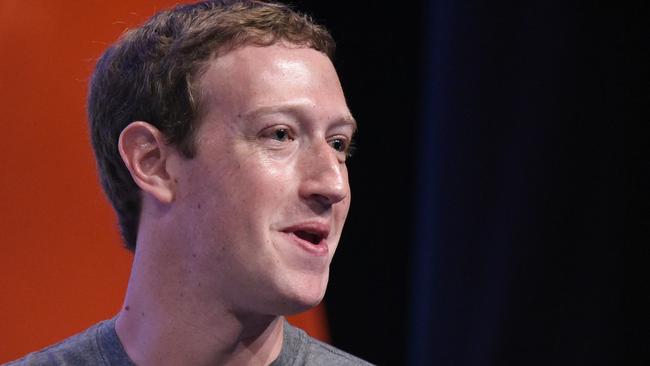Facebook scandal: advertisers threaten to pull out over data leak
Advertisers threatened to abandon Facebook as Mark Zuckerberg admitted the company had bungled the Cambridge Analytica scandal.

Advertisers threatened to abandon Facebook yesterday as Mark Zuckerberg admitted the company had made mistakes over the Cambridge Analytica scandal.
Mr Zuckerberg, co-founder and chief executive of the US technology giant, broke his silence to head off a revolt among users and financial backers.
ISBA, a British group of leading advertisers that spend hundreds of millions of pounds a year on Facebook, demanded answers. It is understood that some of its 3000 brands, which include those of the consumer goods companies Unilever and P&G, will not tolerate association with Facebook if it emerges that users’ data has found its way into the hands of brokers and political campaigners without authorisation.
Sources close to the trade body said if the company’s answers were unsatisfactory, advertisers might spend their money elsewhere. ISBA will meet Facebook executives this week.
The row centres on claims that Cambridge Analytica, the British firm embroiled in allegations of election meddling, obtained the personal data of 50 million Americans without consent. Facebook’s lax terms allowed app developers to access the data of users and their friends with no checks to prevent it being sold on, it is claimed.
Several financial groups said they would stop buying Facebook shares for their ethical investment funds or were reviewing their holdings. Nordea, the largest bank in the Nordic region, which manages about $US433 billion ($560bn), said it had put some of its Facebook investments in “quarantine” while it assessed the impact of the scandal. Union Investment, a German group that manages about $464bn, said it was reviewing its holding of Facebook shares.
Investors are also suing Facebook, claiming it made “false and misleading statements” about policies that failed to prevent Cambridge Analytica from obtaining data intended for use by a Cambridge University researcher, Aleksandr Kogan.
Brian Acton, the co-founder of WhatsApp, led calls to delete Facebook, which trended on Twitter. Mr Acton, whose company was bought by Facebook for $US22bn three years ago, wrote: “It is time. #deletefacebook”. It received 10,000 “likes”.
Facebook shares closed up 0.7 per cent to $US169.39 on Wednesday, halting a slide that wiped $US50bn ($65bn), or 9.2 per cent, off the company’s value on Monday and Tuesday.
Mr Zuckerberg, 33, said “we made mistakes” and “there’s more to do, and we need to step up and do it”. In a Facebook post he pledged to investigate suspicious looking apps and to ban developers who refused to comply with an audit.
“We will restrict developers’ data access even further to prevent other kinds of abuse. For example, we will remove developers’ access to your data if you haven’t used their app in three months. We will reduce the data you give an app when you sign in — to only your name, profile photo and email address.
“We’ll require developers to not only get approval but also sign a contract in order to ask anyone for access to their posts or other private data. And we’ll have more changes to share in the next few days.”
He also promised to add a tool to Facebook showing a user’s apps and the data they can access.
Damian Collins, chairman of the digital, culture, media and sport select committee, tweeted: “Mark Zuckerberg hasn’t addressed why Facebook didn’t deal with concerns about the exposure of Facebook user data at the time and the risks now.”
Dr Kogan, the Russian-linked Cambridge academic who obtained the data of 50 million users by offering “personality quizzes” before selling the data to Cambridge Analytica, told the BBC that “tens of thousands” of apps could have done the same thing.
A Facebook whistleblower told British MPs the company had ignored his warnings and lost control of users’ data by giving easy access to developers. Sandy Parakilas said that when he worked at the company in 2011-12 “personal identifiable data was basically allowed to leave Facebook” and “was not really controlled”.
He told MPs he had warned executives that poor safeguards could enable foreign powers or data brokers to harvest users’ data without consent. He believes the data of hundreds of thousands of users may have been sold on the black market.
ISBA said: “The claims that other apps using the Facebook platform, and pre-dating 2015, have collected similar bodies of personal data and that controls for distribution have been inadequate, raise questions about the possibility that Facebook data has been, or is being used improperly elsewhere. ISBA is asking Facebook for a full account of further potential issues, so that advertisers can take appropriate measures.” It was reported yesterday that Cambridge Analytica was offered material by Israeli hackers who appeared to have obtained private emails from two politicians. Staff were asked to handle material they assumed had been illegally obtained while working on election campaigns for candidates in Nigeria and St Kitts and Nevis, The Guardian alleged.
Cambridge Analytica’s parent company, SCL Elections, denied obtaining or using any hacked or stolen personal information for any purpose in either campaign.
Cambridge Analytica was set up effectively as a brand name for the company’s data analysis services in 2013.
The Times


